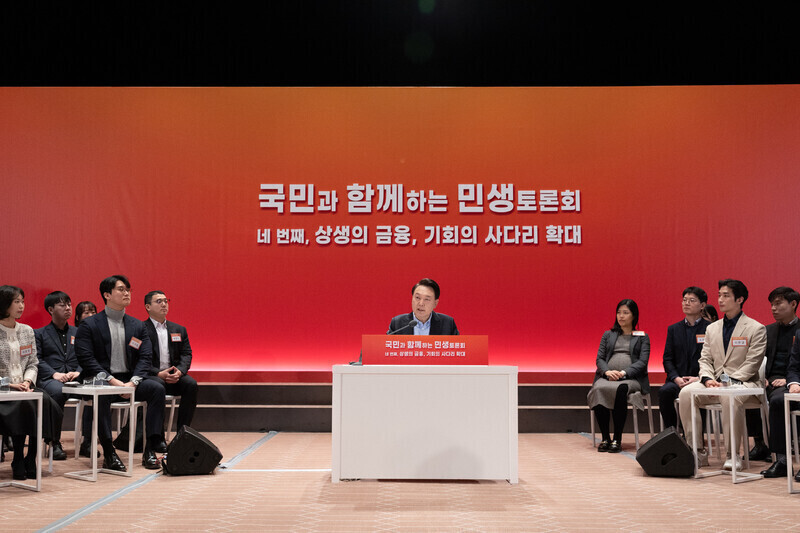hankyoreh
Links to other country sites 다른 나라 사이트 링크
[Column] Chaebol reform isn’t a socialist campaign, it’s a capitalist necessity


By Lee Jae-sung, editorial writer
In a world where everything is regressing, things tend to get smaller or reduced. Along with a reduction in freedom of speech, people’s dreams and the scale of communities’ visions are being downsized. Conservatives’ desire to protect conventions has coupled with the elite’s greed to form a dark cloud that’s blocking the sun, thereby preventing the seeds of change from sprouting. Consequently, the air is getting thinner, each breath more exhausting.
The government’s corporate “value-up program” — all bark and no bite — is just one example. Just a little over a month into 2024, and South Korean President Yoon Suk-yeol announces his plans to solve the “Korea discount,” the problem of Korean shares being chronically undervalued next to their overseas peers. While Yoon’s pep rally began with cheers and optimism, once the administration announced the specifics of its plans, people reverted to cynicism and resignation. The initiative seeks to raise share prices, but it failed to outline how it will enact structural reforms that prevent manipulation and abuse from controlling shareholders.
Anybody who didn’t see this coming is either naive or dull. Yoon confidently announced revisions to the Commercial Act that would protect small-scale shareholders, only to go back on his word while hiding behind the Justice Ministry. When the Korea Fair Trade Commission set out to report companies to prosecutors for gaining unfair profits through monopoly contracts, it originally announced measures to include chaebol leaders in the prosecution — only to withdraw the latter part.
Eager to earn the votes of the country’s 14 million stock traders, the ruling party promised to prohibit short selling while waiving taxes on income from financial investments, yet upon approaching the top of the hill, it pulled the reins and turned the horse around in retreat.
There is a consistent message in all of their behavior: We will not do anything that the chaebol leaders and controlling shareholders oppose.
Even if it was an obvious campaign strategy, people had good reason to be hopeful for a proper “corporate value-up” program. Corporate and commercial reform is not only critical to the country’s economy, it’s directly tied to the fate of our society. Last week, the media seemed to unanimously convey a report by Koh Young-sun, the chief economist at the Korea Development Institute (KDI), saying that South Korea “needs more jobs from conglomerates.”
Koh’s statement and the media frenzy it caused reveal a larger issue at hand. Among OECD nations, South Korea has the lowest share of jobs offered by large companies that employ 250 or more people. According to the KDI, only 13.9% of jobs in the South Korean market are offered by large companies, compared to the OECD average of 32.2%.
Since jobs offered by major firms are usually the most attractive jobs to most workers, this shortage in corporate jobs has led to excessive competition among students for admission into the top universities. It can also be tied to larger, more existential problems like plummeting fertility rates. Essentially, Koh is arguing that an increase in jobs offered by conglomerates can alleviate overheated student competition and declining fertility rates.
It’s notable that the KDI report indicates that South Korea’s proportion of large company jobs is lower than those of Southern European countries of Portugal, Italy, Greece and Spain — which are often referred to by the derogatory acronym PIGS. Among the 32 countries in the OECD, South Korea takes 32nd place. Greece takes 31st. South Korea’s GDP in 2021 was US$1.81 trillion, around eight times that of Greece’s 214.9 billion — yet South Korea offers proportionally fewer jobs at large companies. In other words, if the two economies were the same size, Greece would have more than eight times the number of large companies than South Korea.
What should we make of this? It’s hard to explain this phenomenon without concluding that a disproportionate amount of our economic power is concentrated in a few conglomerates. The chaebol were essentially subsidized by the government during South Korea’s industrialization. They quickly developed a taste for under-the-table deals, reckless expansion, and pirating technology from SMEs — all of which led to their overwhelming monopoly over the market.
At this point, the structural nature of the market makes it very difficult for new companies to even get a start. Cho Duk-sang, a KDI research fellow, outlines this in his paper, “Business Groups and Declining Allocative Efficiency in Korea,” which explains why South Korea’s economy has lost the dynamic forces that once propelled it. SMEs that made their living as suppliers for large corporations suddenly get their contracts canceled. It then turns out that an affiliate or subsidiary of the conglomerate is now supplying the same parts. In countless cases, a subsidiary has taken over exports. SMEs are being robbed of the opportunity to become larger companies.
Concepts like chaebol reform or economic democratization — which are essentially dead words at this point — once involved blocking such practices. But calls for making South Korean capitalism more capitalist are being labeled as some sort of leftist or socialist movement. Consequently, the shares of around two-thirds of KOSPI-listed firms are priced at a price-to-book value ratio of less than 1, meaning their market value is less than the value of their assets on balance sheets. Hence, the Korea discount.
Korea’s chaebol-style of running corporations — hereditary, monopolistic, nepotist — already runs counter to global standards, yet our president is opposing a basic corporate inheritance tax as if it “makes it difficult for family-owned businesses to be passed down to progeny.” Such brazenly anti-capitalist language coming from the mouth of our president on air.
In an age of regression, we need self-reflection and thorough preparation. We need to do away with the ideological poison that accompanies the chaebol’s illicit control over the economy, and we need to reboot our economy from a pragmatic standpoint.
Chaebol reforms that include structural changes to ownership and control aren’t a leftist movement, they are the real solution to solving the Korea discount problem. Going further, that is the long-term solution that will allow us to increase the number of jobs, alleviate excessive student competition, and elevate fertility rates.
Please direct questions or comments to [english@hani.co.kr]

Editorial・opinion
![[Column] Season 2 of special prosecutor probe may be coming to Korea soon [Column] Season 2 of special prosecutor probe may be coming to Korea soon](https://flexible.img.hani.co.kr/flexible/normal/500/300/imgdb/original/2024/0426/3317141030699447.jpg) [Column] Season 2 of special prosecutor probe may be coming to Korea soon
[Column] Season 2 of special prosecutor probe may be coming to Korea soon![[Column] Park Geun-hye déjà vu in Yoon Suk-yeol [Column] Park Geun-hye déjà vu in Yoon Suk-yeol](https://flexible.img.hani.co.kr/flexible/normal/500/300/imgdb/original/2024/0424/651713945113788.jpg) [Column] Park Geun-hye déjà vu in Yoon Suk-yeol
[Column] Park Geun-hye déjà vu in Yoon Suk-yeol- [Editorial] New weight of N. Korea’s nuclear threats makes dialogue all the more urgent
- [Guest essay] The real reason Korea’s new right wants to dub Rhee a founding father
- [Column] ‘Choson’: Is it time we start referring to N. Korea in its own terms?
- [Editorial] Japan’s rewriting of history with Korea has gone too far
- [Column] The president’s questionable capacity for dialogue
- [Column] Are chaebol firms just pizza pies for families to divvy up as they please?
- [Column] Has Korea, too, crossed the Rubicon on China?
- [Correspondent’s column] In Japan’s alliance with US, echoes of its past alliances with UK
Most viewed articles
- 1‘We must say no’: Seoul defense chief on Korean, USFK involvement in hypothetical Taiwan crisis
- 2Is Japan about to snatch control of Line messenger from Korea’s Naver?
- 3Division commander ordered troops to enter raging flood waters before Marine died, survivor says
- 4[Editorial] Korea’s surprise Q1 growth requires objective assessment, not blind fanfare
- 5[Column] Season 2 of special prosecutor probe may be coming to Korea soon
- 6[Special report- Part III] Curses, verbal abuse, and impossible quotas
- 7Flying “new right” flag, Korea’s Yoon Suk-yeol charges toward ideological rule
- 8[Guest essay] The real reason Korea’s new right wants to dub Rhee a founding father
- 9[Column] ‘Choson’: Is it time we start referring to N. Korea in its own terms?
- 10[Column] Park Geun-hye déjà vu in Yoon Suk-yeol